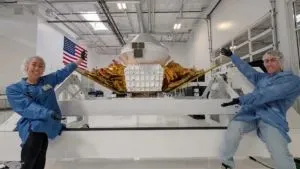It brings the total amount of capital it has raised to $329 million.
The latest investment was led by Natural Capital and Shrug Capital. Also participating were Founders Fund, Peter Thiel, Khosla Ventures, Caffeinated Capital, Lux Capital, and Also Capital.
In orbital laboratories, due to the lack of gravity, materials crystallise differently than they would on Earth. This can create novel drug formulations that would otherwise be impossible, says the company. For example, it is working with the active pharmaceutical ingredients in medicines.
“With this capital, Varda will continue to increase our flight cadence and build out the pharmaceutical lab that will deliver the world’s first microgravity-enabled drug formulation,” said its CEO Will Bruey.
W-Series
Note that Varda works outside of the International Space Station and its laboratory.
Its W-Series spacecraft (pictured) – going into orbit aboard commercial launch vehicles – are free flying capsules capable of safely bringing materials back to Earth.
Varda describes them as a “scalable microgravity formulation platform”, allowing orbital materials a relatively inexpensive ride back to Earth.
“Our new lab space is an investment in our belief that in-space pharmaceutical manufacturing will drive the foundation of the orbital economy,” added its Chief Science Officer Adrian Radocea.
“By expanding, we can support work on more complex molecules and ultimately increase cadence to achieve the turnaround times the pharmaceutical industry expects.”
Varda Space Industries
With its first mission (W-1) in 2023, Varda has completed three successful launch and return missions. A fourth (W-4) is currently in orbit and a fifth expected to launch before the end of the year.
The company also recently expanded into a new 10,000 square foot lab space in its El Segundo, California headquarters.
Its pharmaceutical scientists work on developing processes to crystallize biologics, such as monoclonal antibodies.
The company estimates the market size for monoclonal antibodies to be $210.06 billion, as of 2022.
“Through multiple flights, the Varda team has proven a repeatable orbital-reentry capability, attracted serious DoD demand, and is now turning that momentum toward a world-class crystallization lab that will unlock microgravity manufacturing for life-changing medicines and other high-value materials,” said Ravi Tanuku, General Partner at Natural Capital and a member of the Varda Board of Directors.
“We’re excited to support Varda as it turns this bold vision into reality.”
Hypersonic testbed
Note that in addition to its life sciences work, Varda operates a hypersonic testbed for government partners.
It highlights it is using the W-series reentry vehicle to advance new technologies. The re-entry capsules reach Mach 25 on their journey from space to Earth, which offers a real-world flight environment for testing subsystems. For example, investigating thermal protective materials, and navigation, communication, and sensor technology.
Image: Varda Space Industries – The W-4 vehicle
See also: ISS National Lab launches Orbital Edge Accelerator programme

